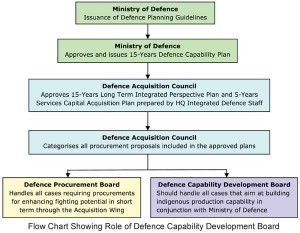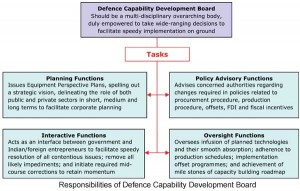Integration of the Private Sector
Despite repeated assertions of the Government to integrate the private sector in defence industry, the defence procurement procedure continues to favour the public sector. Although the defence industry was opened to the private sector in 2001, there is little progress on ground. The private sector continues to be a peripheral player with the production of some low-tech items and components. A handful of India’s top companies have invested considerable resources but have been rewarded with a few small value defence contracts. Major contracts continue to flow to the public sector as hitherto fore. Private sector is on the brink of losing patience.
While the public sector possesses excellent infrastructure, manufacturing facilities and a highly experienced task force, the private sector excels in technology absorption and managerial practices, marketing skills and financial management. The Government has to realise that both public and private sectors are national assets and harnessing of their potential is essential if India wants to achieve self reliance in defence production. Instead of playing favourites, it should facilitate their mutual accommodation and aim at exploiting their respective strengths through synergetic functioning. Both the sectors should be considered equal and indispensable partners in India’s march towards developing a vibrant defence industry.
Attitudinal Changes
Indian officialdom, consisting of career bureaucrats, is known for its arrogant and pompous attitude. Being the ultimate authority to award or deny contracts, they regard businessmen as seekers of favours and treat them with scant respect. Businessmen are viewed as mere wealth seekers. Aware of the power wielded by the officials, Indian business community considers it prudent to keep them in good humour by acquiescing in an unequal equation.
All developed countries acknowledge the contribution made by entrepreneurs and honour them as creators of national wealth.
However, foreign companies find officials’ imperious behaviour to be highly unacceptable, impolite and gratuitous. It is common to hear them complain of non-acknowledgement of key communications and reluctance to grant appointments. A veteran foreign entrepreneur went to the extent of declaring that Indian bureaucracy was the single most dissuasive factor for investors. “How can one enter into a business relationship in India when one is made to feel like a lesser human being? Supercilious attitude of Indian officials is insufferable, to say the least,” he averred.
All developed countries acknowledge the contribution made by entrepreneurs and honour them as creators of national wealth. They are respected for their business acumen, technological skills and managerial excellence. Unless Indian officials change their attitude and learn to treat businessmen as indispensable and equal partners, investors will continue to be wary of doing business in India. It must be understood and accepted that generation of reasonable profit is the prime objective of all business, and there is nothing immoral about it.
Structural Changes – Need for an Overarching Authority
Creation of a manufacturing hub would entail grant of numerous licences and permission by a multitude of ministries and departments. Also, a number of policy questions would invariably crop up needing immediate decision making. Presently, there is no centralized authority empowered to handle all issues pertaining to defence industry in India. Vendors are made to run from one office to another. As is done in almost all countries, a multi-disciplinary “Defence Capability Development Board” (DCDB) must be constituted under the Commerce Minister to oversee the complete gamut of related activities. It should act as a single window interface for all entrepreneurs.
 On the basis of the Defence Planning Guidelines, the MoD prepares and approves 15-Years Defence Capability Plan. From the above plan flows 15-Years Long Term Integrated Perspective Plan (LTIPP) for the three services. It is prepared by HQ Integrated Defence Staff in consultation with Service HQ and Approved by the Defence Acquisition Council (DAC) under the Defence Minister. 5-Years Services Capital Acquisition Plan (SCAP) is extracted from LTIPP and duly approved by DAC. Both LTIPP and SCAP spell out services’ requirement of equipment in medium and long terms.Additionally, DAC categorises various procurement proposals based on the need to enhance fighting capability in short term vis-a-vis acquisition of technology to build indigenous capacities in a longer time frame. All cases pertaining to capability enhancement should flow to the Defence Procurement Board for initiating acquisition action by the Acquisition Wing. Simultaneously, cases that aim at building capacity through acquisition of technology should be passed on to DCDB. It should be for DCDB to consider various alternatives in conjunction with MoD and select the most efficient and cost-effective route. See Figure.
On the basis of the Defence Planning Guidelines, the MoD prepares and approves 15-Years Defence Capability Plan. From the above plan flows 15-Years Long Term Integrated Perspective Plan (LTIPP) for the three services. It is prepared by HQ Integrated Defence Staff in consultation with Service HQ and Approved by the Defence Acquisition Council (DAC) under the Defence Minister. 5-Years Services Capital Acquisition Plan (SCAP) is extracted from LTIPP and duly approved by DAC. Both LTIPP and SCAP spell out services’ requirement of equipment in medium and long terms.Additionally, DAC categorises various procurement proposals based on the need to enhance fighting capability in short term vis-a-vis acquisition of technology to build indigenous capacities in a longer time frame. All cases pertaining to capability enhancement should flow to the Defence Procurement Board for initiating acquisition action by the Acquisition Wing. Simultaneously, cases that aim at building capacity through acquisition of technology should be passed on to DCDB. It should be for DCDB to consider various alternatives in conjunction with MoD and select the most efficient and cost-effective route. See Figure.
DCDB should not be seen to be replacing MoD in any policy domain. Functioning of DPDB should be broadly on the lines of the Border Roads Development Board (BRDB), albeit with suitable changes. BRDB is an inter-ministerial body with a status of Department of the Government of India with administrative control under MoD while funds for the roads are provided by the Ministry of Shipping and Transport.
Production and procurement of defence equipment for modernisation of the armed forces are multifaceted processes requiring highly specialised expertise. It is not a routine governmental activity. MoD neither has the necessary expertise nor the resources (including time) to handle all such complexities. DCDB could be a facilitating mechanism to help MoD to achieve its goal of self sufficiency. DCDB should take guidance and directions from MoD and implement them on ground in a professional and concerted manner. See Figure 4 for the tasks that should be assigned to DCDB.
The Way Forward
 India must become a key player in global supply chain. For that, there has to be a fundamental change in our approach towards the defence industry. The following steps are recommended:-
India must become a key player in global supply chain. For that, there has to be a fundamental change in our approach towards the defence industry. The following steps are recommended:-
- Demand for FDI in defence has become highly competitive as a large number of suitors are chasing a few defence equipment giants. India must resort to an innovative Investment Promotion (IP) drive. IP has come to be accepted as the most indispensable factor to create a favourable image and generate interest amongst the investors to look at a location more closely. IP should encompass all activities that contribute towards making a location attractive to foreign investors.
- India should focus on technology infusion and upgradation of indigenous industrial base. Therefore, incentives should be offered as per the quality and level/depth of technology being transferred. Incentives can be both fiscal (loans, grants and tax exemptions) and non-fiscal (land allotment, infrastructural facilities and training assistance).
- Close and transparent cooperation between MoD and defence industry is a prerequisite. It should be based on mutual trust. Architecture of the hub should be such that the armed forces get assured supplies of critical equipment with best value for money. Simultaneously, investors should get fair and reasonable return on their investments with minimal risks.
- It is universally accepted that offsets make sound business sense only if the trade-off results in extraordinary economic or technological gains. Leverage of offsets must be effectively used to obtain critical technologies that industrially-advanced countries are reluctant to sell.
- A single empowered authority should be constituted to provide single window clearances and guidance to all entrepreneurs.
Defence industry comprises of all industrial undertakings engaged in the production of hardware and services for use by the defence forces. In addition to economic factors, defence industry is generally considered to be an instrument of national sovereignty and pride. Given its favourable geo-political position and technical man-power, India must strive to be a hub for global outsourcing and partner co-production of defence products as a part of multi-nation consortiums. Development of a defence industry hub will bring technology and intellectual assets, thereby imparting ‘knowledge edge’ to the indigenous industry and contributing to generation of employment opportunities and national prosperity. Without technological and commercial competitiveness, no industry can sustain itself for long in open competition. Therefore, India has to put its act together in an innovative manner.





BEML is a leading defence manufacturingfirm in India. As a government project they are emerging as countrys leading bulletproof military vehicle manufacturer in India.
Major Suman provides an excellent summary and a starting point on the matter of defense production. A caution is in order. Planning nation’s need for the cutting edge defense equipment in a rapidly changing world will require major overhaul of the way India invests in the defense equipment. FDI is one option and should be pursued vigorously. Private sector involvement in the defense production, however, must play a major role if India is to make a dent. The examples in US and Europe point the direction. Most leading producers of advance equipment in the world are privately owned with exceptions in Russia and China. The backbone is knowledge pertaining to defense technologies. This must be acquired by any means possible to leverage the developing capabilities of the indigenous sources. Universities, National and Private Labs, and research institutions nationwide must be part of the knowledge building. Regulations and government control must be cleaned up and made free of babu-raj corruptions. Here, because of past disasters, the PM office must personally oversee the transaction regime. All this is vital not only from the standpoint of national security but is a vital part of the economic development of the nation. Just look at the huge investments being made in purchasing foreign made defense equipment, which are often outdated by the time these are put to use. If most of these purchases were made in India from the Indian producers, the jobs and the rollover effect would benefit endlessly beside providing the most advance defense equipment for the nation’s security.